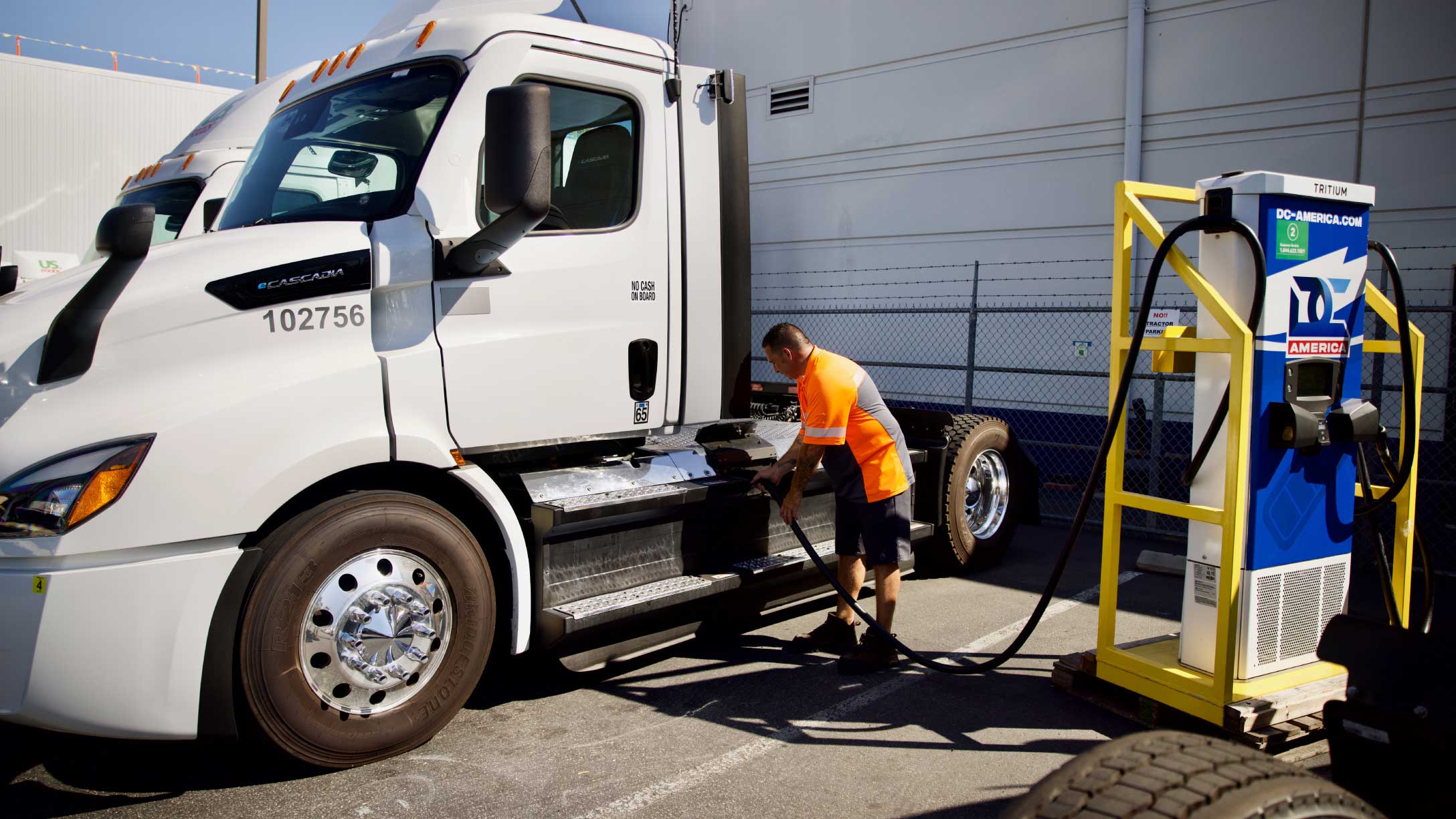NACFE’s Mike Roeth on the Future of EVs in Trucking
The shift to BEVs and usage of clean technologies is changing

Senior Manager, Sustainable Mobility at Geotab
Jul 17, 2025

Mike Roeth, Executive Director of the North American Council for Freight Efficiency (NACFE), recently spoke with Charlotte Argue on the future of transportation, including the state of commercial adoption of electric vehicles, freight efficiency and electrification trends. With more than 35 years in the commercial vehicle industry, Mike has seen practices evolve and has been instrumental in bringing green truck collaborative opportunities to the real-world at scale.
Interview with Mike Roeth, NACFE
Geotab: What exciting innovations are you seeing in trucking?
Mike Roeth: It is hard to point to just one thing when talking about innovation in the trucking industry today. The industry is working on a variety of technology solutions to get us to a zero-emission freight future. This is something we should be proud of as we are recognizing our responsibility to operate in a more sustainable manner.
Geotab: How do you see the role of battery electric vehicles (BEVs) evolving for fleets?
Mike Roeth: Today battery electric vehicles are already being successfully deployed by fleets in a wide variety of applications. I expect to see more fleets move from having one or two BEVs to having 10, 15, 20 or more. As battery weight comes down, range increases and there starts to be a better opportunity for charging at locations other than fleet depots, I expect we will see more fleets deploying BEVs in larger and larger numbers.

Geotab: Beyond BEVs, what other clean powertrain technologies do you believe hold promise for the trucking industry?
Mike Roeth: We are in a time that NACFE has dubbed the “messy middle.” During this time fleets have access to a variety of powertrain options in addition to BEVs, including fuel cell electric, renewable diesel, hydrogen, hydrogen internal combustion, renewable natural gas and hybrids. The key is to match the right powertrain to the right application. There is no one-size-fits-all solution as we move to a cleaner transportation future.
Geotab: What is a common misunderstanding about BEVs and their capabilities?
Mike Roeth: People erroneously believe that BEVs always need to be charged to 100%. The reality is that BEVs can still operate effectively at reduced state of charge levels. Opportunity charging allows a fleet to increase the battery’s state of charge so a truck can finish its route without needing to be fully recharged.
Geotab: How do you respond to the concerns of those who believe BEVs are not yet a viable option for all trucking applications?
Mike Roeth: To some extent they are correct. Today BEVs are proving to be a viable option for terminal tractors, vans and step vans, medium-duty box trucks and Class 8 trucks in regional haul applications. People mistakenly believe that all trucking is long haul but that is not true. In addition, significant improvements are being made in BEVs every day. In Run on Less – Electric DEPOT, the Tesla Semi saw ranges of 410 miles on a single charge and completed 1,076 miles in a 24-hour period. NACFE is planning Run on Less – Messy Middle in 2025 and it will focus on the various powertrain options — including BEVs — in the long-haul segment of trucking.
Geotab: In what ways can OEMs, fleets, and regulatory bodies collaborate to accelerate the adoption of BEVs?
Mike Roeth: There is some complexity when switching to BEVs so that the right vehicle is chosen for the application and to ensure that the proper infrastructure is in place when the vehicles arrive. Fleets and OEMs can work closely with utility providers and others so that the infrastructure is in place when needed. In addition, fleets and OEMs can share real-world information with regulatory agencies so that regulations are not onerous but help move the industry closer to decarbonizing.
Geotab: How do you envision the trucking industry’s landscape in the next 5-10 years, in relation to BEVs and other clean technologies?
Mike Roeth: More fleets will be making investments in BEVs and other clean technologies. We will continue to see fleets operating vehicles with a variety of powertrains as they match powertrains to duty cycles to optimize efficiency.
About NACFE
The North American Council for Freight Efficiency (NACFE) works to drive the development and adoption of efficiency enhancing, environmentally beneficial, and cost-effective technologies, services, and operational practices in the movement of goods across North America. NACFE provides independent, unbiased research, including Confidence Reports on available technologies and Guidance Reports on emerging ones, which highlight the benefits and consequences of each, and deliver decision-making tools for fleets, manufacturers, and others. NACFE partners with RMI on a variety of projects including the Run on Less freight efficiency demonstration series, electric trucks, emissions reductions, and low-carbon supply chains.
Geotab has been the official data partner of Run on Less since 2017. For more on fleet electrification, explore the Geotab Taking Charge Report and see the top takeaways from Run on Less - Electric DEPOT.
Subscribe to get industry tips and insights

Senior Manager, Sustainable Mobility at Geotab
Charlotte Argue is a sustainable transportation and electric vehicles (EVs) thought leader, working on green fleet initiatives since 2008.
Table of Contents
Subscribe to get industry tips and insights
Related posts


Elevating Worker Safety Through Simplicity: The OK Alone Story
December 3, 2025
2 minute read

The $4B Crisis: Video Intelligence as the Answer to Fleet Distraction
December 2, 2025
3 minute read

The True Cost of Cargo Theft: When Customer Trust is on the Line
November 24, 2025
2 minute read

Protecting Our Most Precious Cargo: How Telematics is Powering a Safer Ride to School
October 23, 2025
2 minute read

From data to foresight: How VisionTrack is transforming fleet safety
October 14, 2025
2 minute read